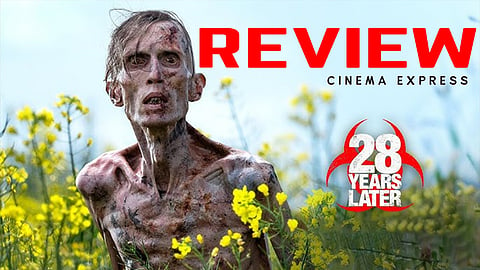28 Years Later Movie Review: A breathtaking reflection of humans in survival mode
28 Years Later Movie Review(3.5 / 5)
Thousands of years of human inventions have been for improving existing living conditions beyond water, safety, and food. Little luxuries like a smartphone would have been useless for humans of the previous era, but one wonders what humans will do if they are forced to survive with the fear of a grave threat that is always hunting them, with the dangers that come with the threat adapting to their environment. Director Danny Boyle and writer Alex Garland return to the British Isles, which are now quarantined due to the threat of the Rage Virus being pushed back from continental Europe. We get to see the story of human society in that place, 28 Years Later…
Director: Danny Boyle
Cast: Jodie Comer, Aaron Taylor-Johnson, Alfie Williams, Chi Lewis-Parry, Jack O’Connell, and Ralph Fiennes
Alex Garland’s world doesn’t provide commentary in an obvious manner, but with minute details he adds some representations for the British Isles. Through Spike (Alfie Williams), we discover the extent of the virus’ affliction on the rest of the Isles, as he leaves the safe haven of his isolated home for the mainland for the first time. We also discover that Spike’s mother, Isla, is sick, with his father, Jamie, putting all hopes of treating his mother’s illness to rest, citing danger as the main reason. Through Spike’s inability to accept his mother’s state, Garland successfully writes an aspirational story for anyone experiencing the current geopolitical climate who wants to better their country. We are able to root for Spike to succeed in his mission because we feel his angst caused by helplessness. We feel his sadness caused by his father’s reactions to his mother’s anguish.
With 28 Years Later, Danny Boyle also returns to the franchise trademarks of Dutch angles and smash cuts that continue to disorient and keep the audience on edge. With the disorienting angles, Anthony Dod Mantle expresses the mood of a particular scene by displaying the climate of the places the characters journey through. When Spike is traversing some fields, Mantle's camera captures the heat of the sun in a way that expresses his drive without depending on dialogues, music, or even acting. Mantle’s cinematography also displays the night colourfully, enhancing visibility to the environment. Using this technique, instead of displaying the nocturnal scene in pitch black, elevates the tension as the jump scare is now hidden in plain sight. Alongside the rest of the technical touches, composers of the film’s music Young Fathers use their progressive rock persona to maintain the thrill of the ride, filling in spaces without dialogue. With such choices, the film differentiates itself from the rest of the genre.
In a film with a lot to offer, Alfie Williams rises above his peers to deliver an exemplary performance in his first starring role. As Spike, Williams deftly handles the full range of emotions his character deals with. In Spike’s journey from being unaware to fully realised, Williams moves past the boundary of acting into being the character. Jodie Comer as Isla is a force of nature, whose performance adds to the tension. Isla’s descent into losing her faculties to her illness is portrayed by Comer with supreme conviction, as in moments where the story is docile, her dialogues make up for the lack of tension. Edvin Ryding, as the grounded Swedish sailor Erik, adds some levity to the film while acting as a representation of a person whose home is untouched by the illness. Aaron Taylor-Johnson as Jamie and Ralph Fiennes as Dr Kelson play two polar opposite individuals who are impacted by the virus’ aftereffects with certainty.
28 Years Later lives up to its predecessors as a worthy entrant to the franchise. Though most of its story seems like a run-up to the next film, 28 Years Later provides the thrill-filled roller coaster ride that audiences expect from it.

